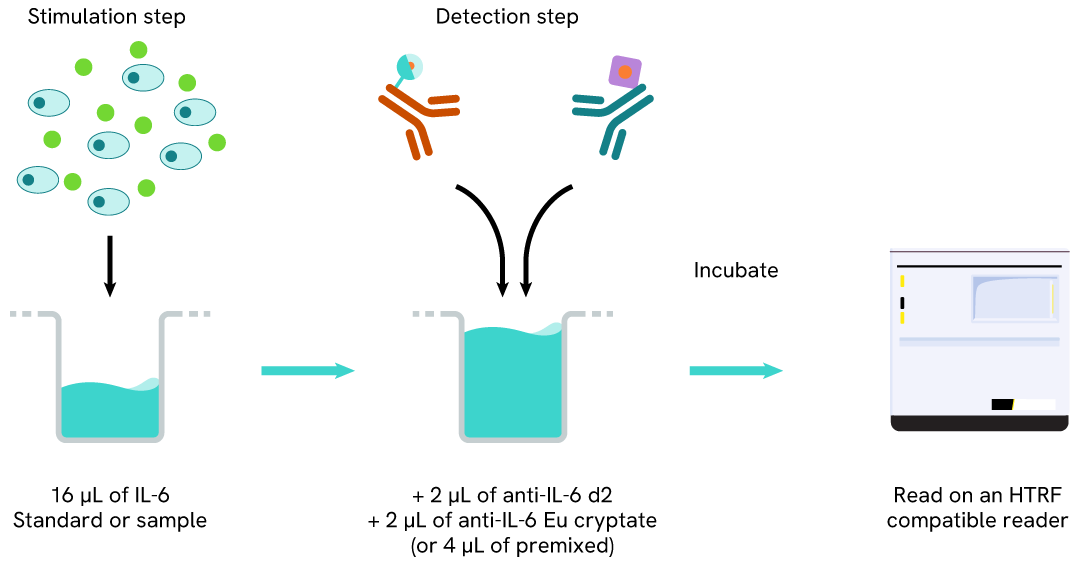

HTRF High Performance Human IL-6 Detection Kit, 96 Assay Points
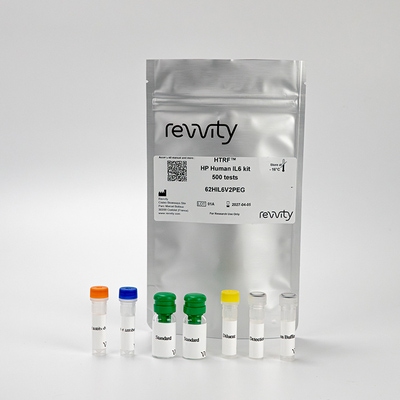
HTRF High Performance Human IL-6 Detection Kit, 96 Assay Points
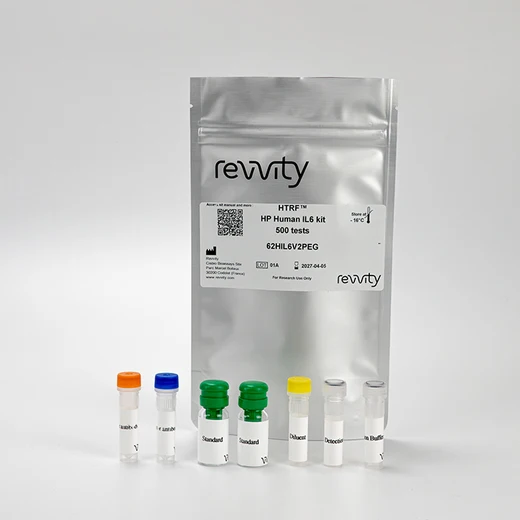

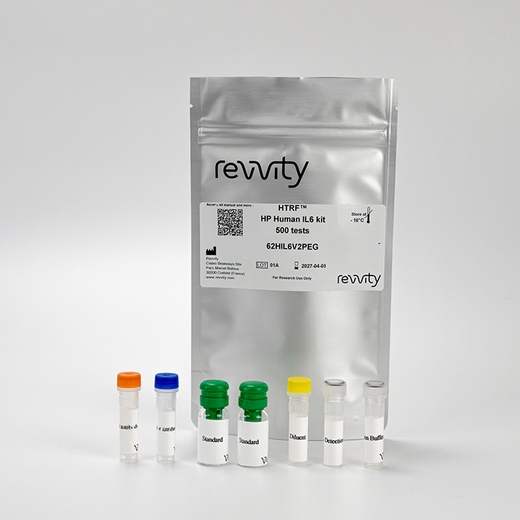

The HTRF High Performance Human IL-6 kit is designed for the simple and rapid quantification human IL-6 release from cell supernatants. This kit is the new and improved version of part number 62HIL06PE, the Human IL-6 Detection Kit.
For research use only. Not for use in diagnostic procedures. All products to be used in accordance with applicable laws and regulations including without limitation, consumption and disposal requirements under European REACH regulations (EC 1907/2006).
The HTRF High Performance Human IL-6 kit is designed for the simple and rapid quantification human IL-6 release from cell supernatants. This kit is the new and improved version of part number 62HIL06PE, the Human IL-6 Detection Kit.
For research use only. Not for use in diagnostic procedures. All products to be used in accordance with applicable laws and regulations including without limitation, consumption and disposal requirements under European REACH regulations (EC 1907/2006).


HTRF High Performance Human IL-6 Detection Kit, 96 Assay Points


HTRF High Performance Human IL-6 Detection Kit, 96 Assay Points


Product information
Overview
IL-6 is a pro-inflammatory cytokine involved in acute-phase reaction, inflammation, and cancer progression. Secreted by T cells, macrophages, and fibroblasts, it induces B and T cell proliferation. It is being studied in a wide variety of research areas including diabetes, Alzheimer's disease, depression, and several cancers. Along with TGF beta, IL-6 is main promoter of T cell differentiation into TH17, a new component of immuno-oncology.
Assessment of serum samples often requires enhanced sensitivity. In some cases, AlphaLISA assays may have sufficient sensitivity to enable detection of low levels of analytes in serum or plasma.
Specifications
| Brand |
HTRF
|
|---|---|
| Detection Modality |
HTRF
|
| Shipping Conditions |
Shipped in Dry Ice
|
| Target |
IL-6
|
| Target Class |
Cytokine
|
| Therapeutic Area |
Inflammation
Neuroscience
Oncology
|
| Unit Size |
96 Assay Points
|
How it works
Principle of the HTRF HP human IL-6 assay
Cell supernatant sample, or standard is dispensed directly into the assay plate for the detection by HTRFTM reagents (384-well low-volume white plate or Revvity low-volume 96-well plate in 20 µl). The antibodies labeled with the HTRF donor and acceptor are pre-mixed and added in a single dispensing step, to further streamline the assay procedure. The assay can be run up to a 1536-well format by simply resizing each addition volume proportionally.

Assay data analysis
The 4 Parameter Logistic (4PL) curve is commonly recommended for fitting an ELISA standard curve. This regression enables the accurate measurement of an unknown sample across a wider range of concentrations than linear analysis, making it ideally suited to the analysis of biological systems like cytokine releases.
Assay details
HTRF HP human IL-6 standard curve
The HP human IL-6 standard curve is generated in the assay Diluent 5 provided in the kit
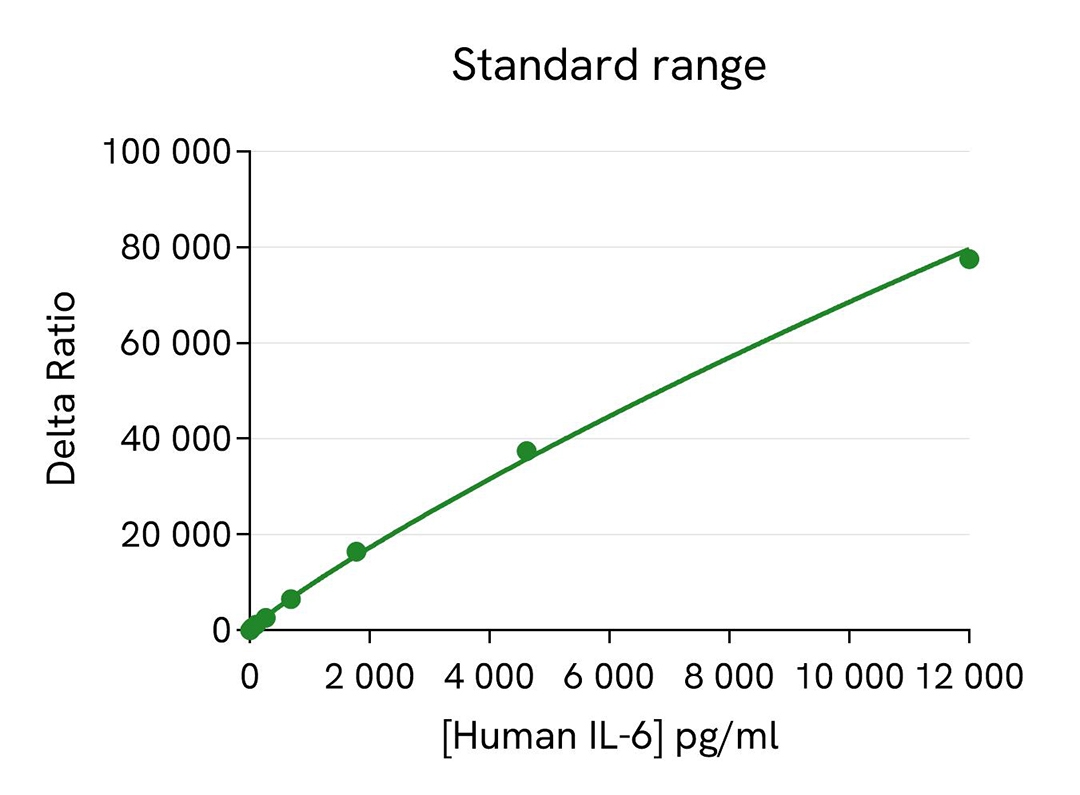
| Sample size | 16 µL |
|---|---|
| Final assay volume | 20 µL |
| Kit components | Lyophilized standard, frozen detection antibodies, buffers & protocol |
| LOD & LOQ (in Diluent) | 10 pg/mL & 16 pg/mL |
| LOD & LOQ (in DMEM+10%FCS) | 16 & 24 pg/mL |
| LOD & LOQ (in RPMI+10%FCS) | 11 & 21 pg/mL |
| Range | 38.8 - 12000 pg/mL |
| Time to result | 2h at RT |
| Correspondance to I.S. | NIBSC (89/548) value (IU/mL) = 0,1 x HTRF HP hIL6 value (pg/mL) |
| Species | Human only |
Analytical performance
Intra-assay precision table
Each of the 3 samples was measured 24 times, and the % CV was calculated for each sample.
| Sample | Mean [IL-6](pg/mL) | CV |
|---|---|---|
| 1 | 47 | 14% |
| 2 | 695 | 7% |
| 3 | 4588 | 5% |
| Mean CV | 9% |
Inter-assay precision table
Each of the samples was measured in 3 independent experiments (3 days), and the % CV was calculated for each sample.
| Sample | Mean [IL-6] (pg/mL) | CV |
|---|---|---|
| 1 | 96 | 10% |
| 2 | 1862 | 6% |
| 3 | 4829 | 5% |
| Mean CV | 7% |
Dilutional linearity
The recovery percentages obtained from these experiments show the good linearity of the assay.
| Dilution Range | Dilution factor | [IL-6] Expected (pg/mL) | [IL-6] detected (pg/mL) | Recovery |
|---|---|---|---|---|
| 1 | 1 | 10254 | 9841 | 96% |
| 2 | 4920,5 | 4776 | 97% | |
| 4 | 2460 | 2338 | 95% | |
| 8 | 1230 | 1080 | 88% | |
| 16,5 | 615,1 | 501 | 82% | |
| Mean | 91% | |||
| 2 | 1 | 10254 | 10465 | 102% |
| 1,5 | 6976 | 6763 | 97% | |
| 2,25 | 4651 | 4510 | 97% | |
| 3,37 | 3100 | 2761 | 89% | |
| 5,07 | 2067 | 1793 | 87% | |
| Mean | 94% | |||
Spike and recovery
The same amount of recombinant cytokine was added to 2 different serum samples, and the set of responses obtained from a standard curve was compared to the calculated expected values. The ~ 100% of recovery observed validates the sample matrix used for this assay.
| Sample |
[IL-6] Spiked Sample (pg/mL) |
[IL-6] Standard (pg/mL) |
Expected (pg/mL) |
Measured (pg/mL) |
Recovery |
|---|---|---|---|---|---|
| 1 | 1855 | 210 | 1033 | 947 | 92% |
| 1406 | 1645.5 | 1512 | 92% | ||
| 2 |
10254 |
210 | 5232 | 4758 | 91% |
| 1406 | 5830 | 6013; | 103% | ||
| Mean CV | 94% |
Cross reactivities
Cross reactivities were assessed using recombinant proteins from the IL-6 cytokine family. Proteins were tested up to 10 000 pg/mL and standard curves were generated for each. Signals were interpolated on the assay standard curve to interpolate concentrations.
| Tested protein | Cross reactivity |
|---|---|
| Human IL-6 | 100% |
| Mouse IL-6 | 0% |
| Cynomolgus IL-6 | 3% |
Assay validation
hIL-6 secretion in PBMCs cells stimulated with LPS
PBMC plated at 50, 100, 200 and 400 kcells/well were stimulated for 18h with LPS at 0 to 2 µg/mL. Then 16 µL of supernatants pre-diluted were transferred into a white detection plate (384 low volume) to be analyzed using the HP Human IL-6 Assay Kit.
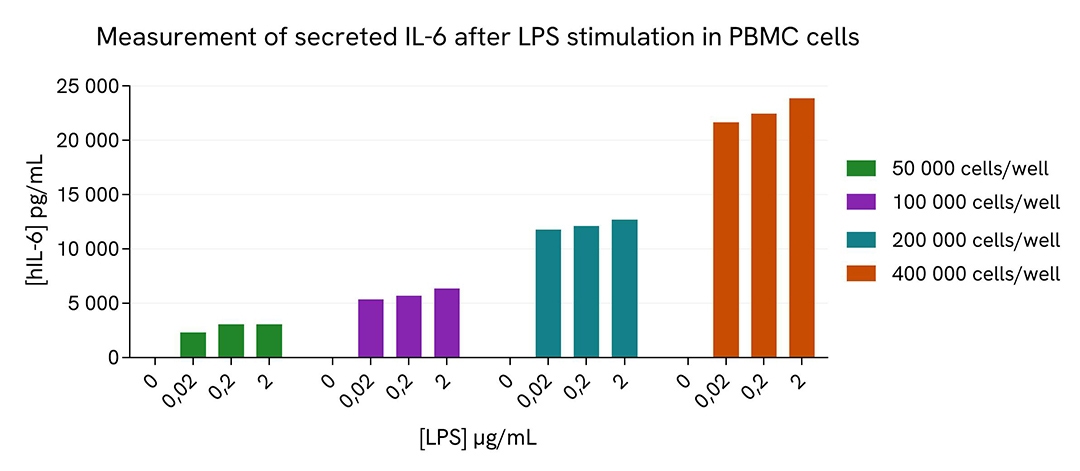
Effect of dexamethasone on PBMC induced IL-6 release
PBMCs plated at 200 kcells/well were stimulated for 18h with increasing concentrations of dexamethasone in presence of 2 µg/mL LPS. Then 16 µL of supernatants pre-diluted were transferred into a white detection plate (384 low volume) to be analyzed using the HP Human IL-6 Assay Kit.
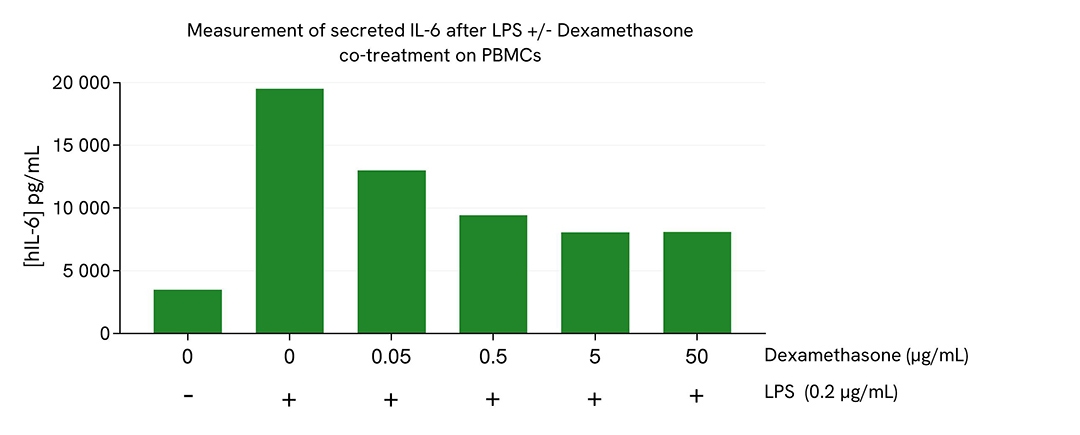
Effect of JTE-607 on PBMC induced IL-6 release
PBMCs plated 50, 100, 200 and 400 kcells/well were stimulated for 18h with 5 µM of JTE-607 in presence of 0,2 µg/mL LPS. Then 16 µL of supernatants pre-diluted were transferred into a white detection plate (384 low volume) to be analyzed using the HP Human IL-6 Assay Kit
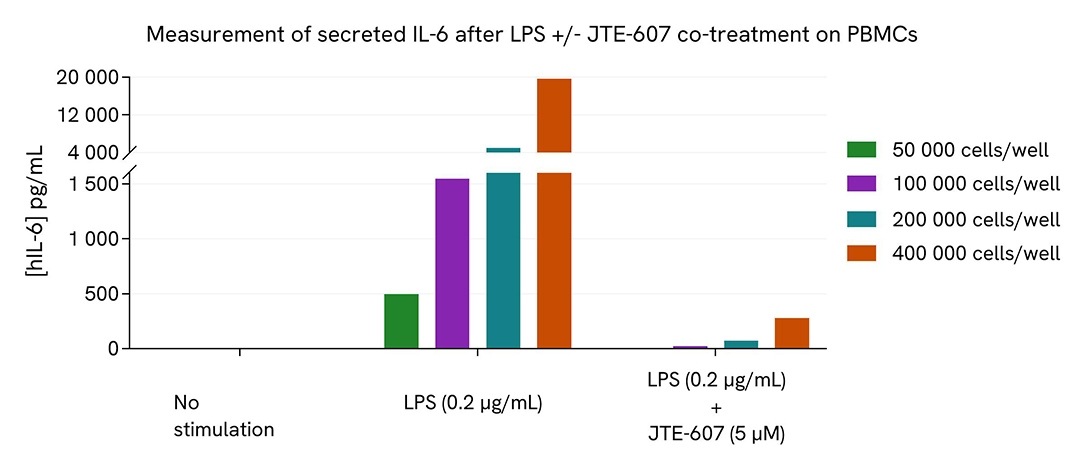
Resources
Are you looking for resources, click on the resource type to explore further.
Dive deeper into fibrosis research
In fibrotic disorders, the normal regulation of the extracellular matrix (ECM) is compromised...
Fibrotic disorders are complex diseases believed to stem from uncontrolled and excessive wound healing processes. The exact causes...


How can we help you?
We are here to answer your questions.






























